Evaluating Change Management and Resistance in UK Hospitality
VerifiedAdded on 2023/06/05
|34
|10261
|243
Thesis and Dissertation
AI Summary
This dissertation examines organizational change management within the UK hospitality industry, focusing on the evaluation of change practices and the reasons behind employee resistance. The study employs a mixed methodology, utilizing both primary data collected through questionnaires and quantitative analysis to interpret the findings. It explores the crucial role of change management in the UK hospitality sector and investigates strategies employed by hospitality companies to address employee resistance. The research delves into the impact of change on business functions, the factors driving employee resistance, and the effectiveness of various change management strategies. The dissertation includes a literature review, detailed methodology, findings, analysis, and recommendations, offering insights into managing change effectively within the dynamic hospitality environment. The study also highlights the importance of communication and employee engagement in successful change implementation. Furthermore, the dissertation discusses the importance of change management to maintain a competitive edge in the industry, and emphasizes the need for proactive planning and adaptation to ensure long-term success.
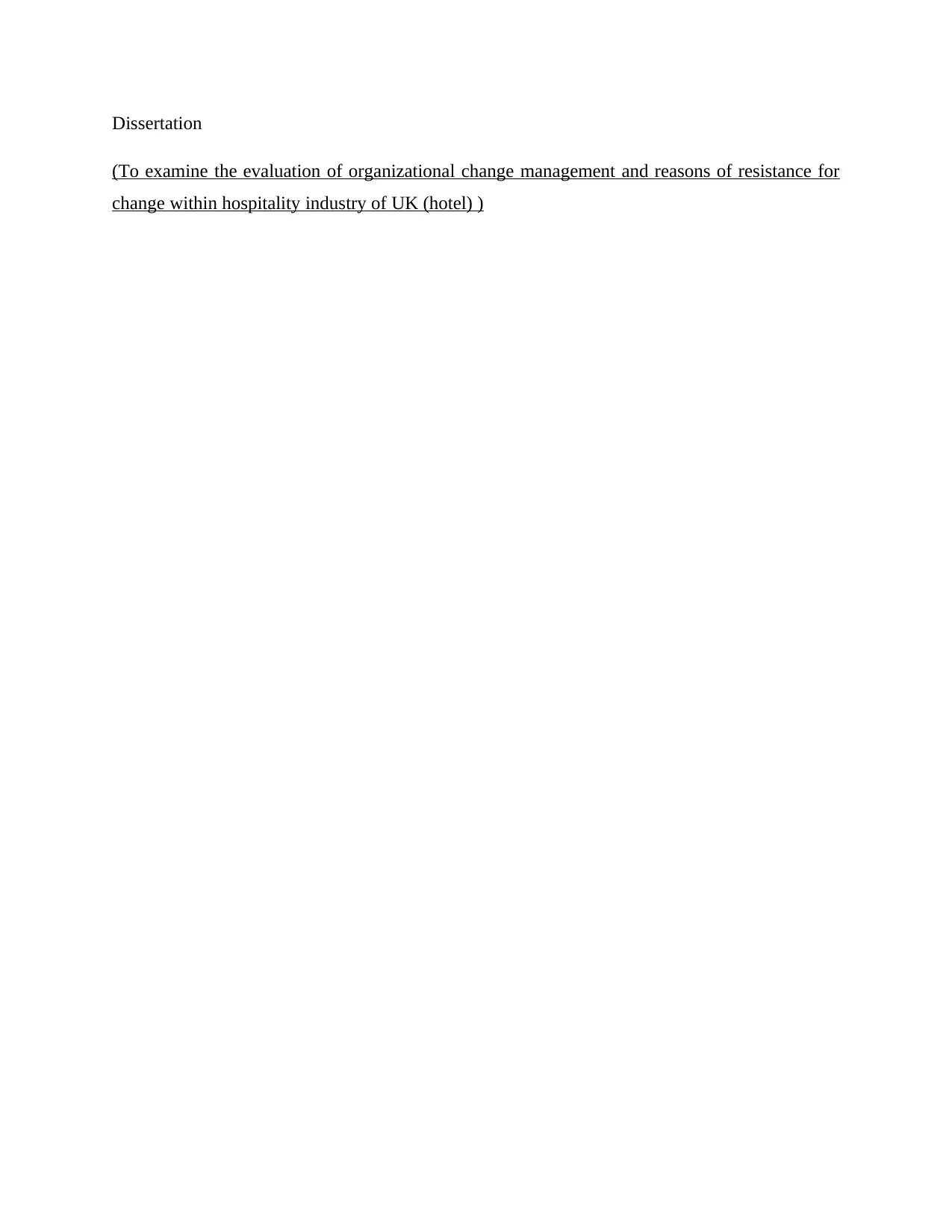
Dissertation
(To examine the evaluation of organizational change management and reasons of resistance for
change within hospitality industry of UK (hotel) )
(To examine the evaluation of organizational change management and reasons of resistance for
change within hospitality industry of UK (hotel) )
Paraphrase This Document
Need a fresh take? Get an instant paraphrase of this document with our AI Paraphraser
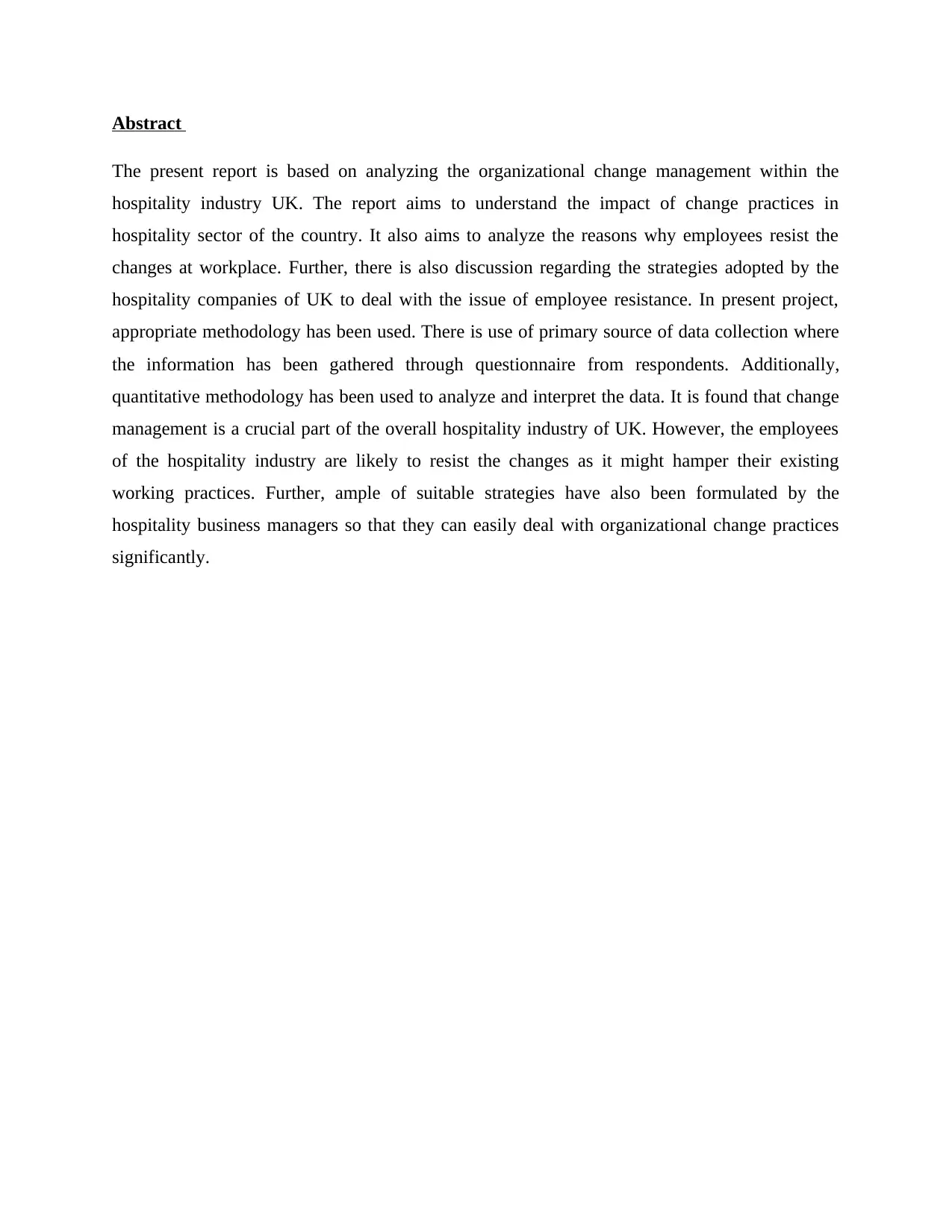
Abstract
The present report is based on analyzing the organizational change management within the
hospitality industry UK. The report aims to understand the impact of change practices in
hospitality sector of the country. It also aims to analyze the reasons why employees resist the
changes at workplace. Further, there is also discussion regarding the strategies adopted by the
hospitality companies of UK to deal with the issue of employee resistance. In present project,
appropriate methodology has been used. There is use of primary source of data collection where
the information has been gathered through questionnaire from respondents. Additionally,
quantitative methodology has been used to analyze and interpret the data. It is found that change
management is a crucial part of the overall hospitality industry of UK. However, the employees
of the hospitality industry are likely to resist the changes as it might hamper their existing
working practices. Further, ample of suitable strategies have also been formulated by the
hospitality business managers so that they can easily deal with organizational change practices
significantly.
The present report is based on analyzing the organizational change management within the
hospitality industry UK. The report aims to understand the impact of change practices in
hospitality sector of the country. It also aims to analyze the reasons why employees resist the
changes at workplace. Further, there is also discussion regarding the strategies adopted by the
hospitality companies of UK to deal with the issue of employee resistance. In present project,
appropriate methodology has been used. There is use of primary source of data collection where
the information has been gathered through questionnaire from respondents. Additionally,
quantitative methodology has been used to analyze and interpret the data. It is found that change
management is a crucial part of the overall hospitality industry of UK. However, the employees
of the hospitality industry are likely to resist the changes as it might hamper their existing
working practices. Further, ample of suitable strategies have also been formulated by the
hospitality business managers so that they can easily deal with organizational change practices
significantly.
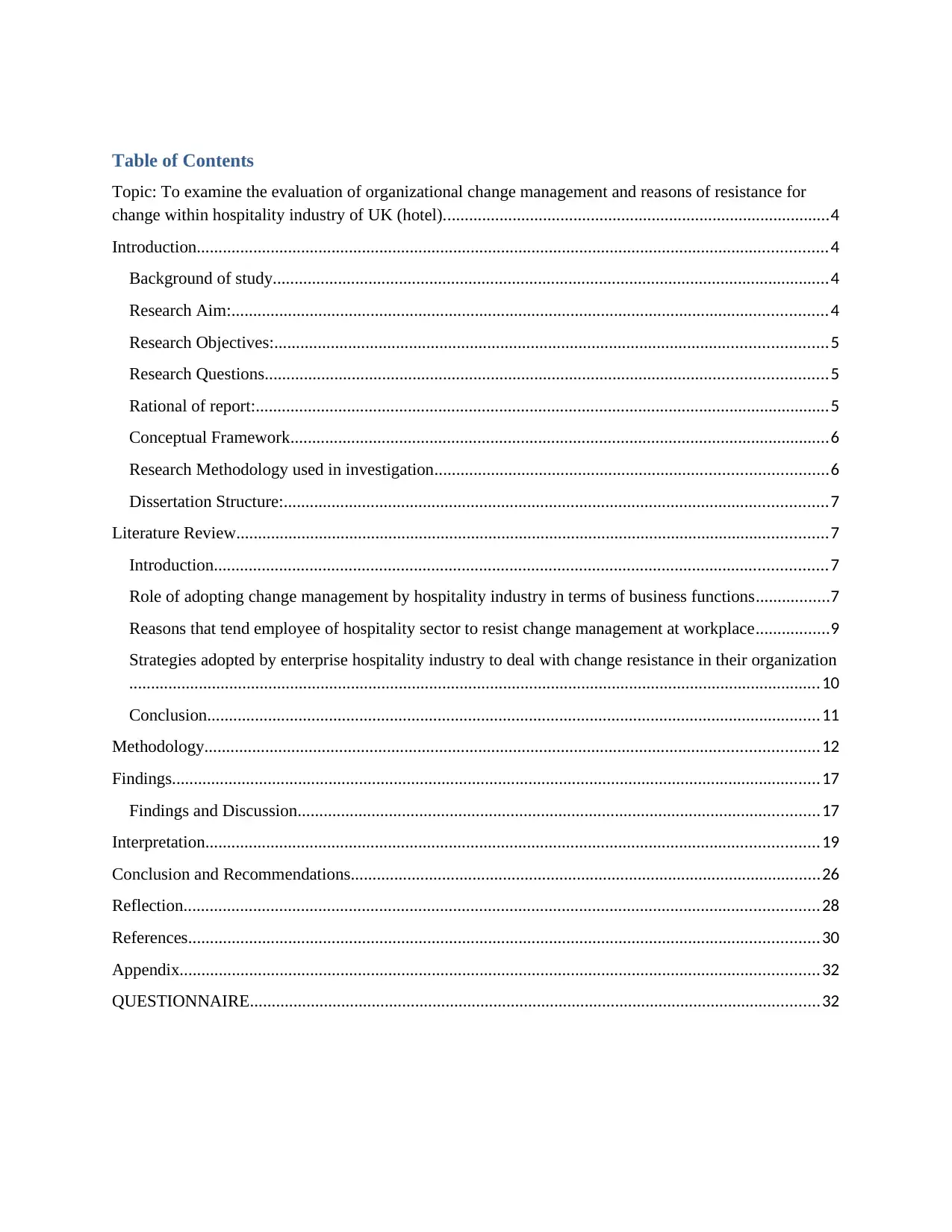
Table of Contents
Topic: To examine the evaluation of organizational change management and reasons of resistance for
change within hospitality industry of UK (hotel).........................................................................................4
Introduction.................................................................................................................................................4
Background of study................................................................................................................................4
Research Aim:.........................................................................................................................................4
Research Objectives:...............................................................................................................................5
Research Questions.................................................................................................................................5
Rational of report:....................................................................................................................................5
Conceptual Framework............................................................................................................................6
Research Methodology used in investigation..........................................................................................6
Dissertation Structure:.............................................................................................................................7
Literature Review........................................................................................................................................7
Introduction.............................................................................................................................................7
Role of adopting change management by hospitality industry in terms of business functions.................7
Reasons that tend employee of hospitality sector to resist change management at workplace.................9
Strategies adopted by enterprise hospitality industry to deal with change resistance in their organization
...............................................................................................................................................................10
Conclusion.............................................................................................................................................11
Methodology.............................................................................................................................................12
Findings.....................................................................................................................................................17
Findings and Discussion........................................................................................................................17
Interpretation.............................................................................................................................................19
Conclusion and Recommendations............................................................................................................26
Reflection..................................................................................................................................................28
References.................................................................................................................................................30
Appendix...................................................................................................................................................32
QUESTIONNAIRE...................................................................................................................................32
Topic: To examine the evaluation of organizational change management and reasons of resistance for
change within hospitality industry of UK (hotel).........................................................................................4
Introduction.................................................................................................................................................4
Background of study................................................................................................................................4
Research Aim:.........................................................................................................................................4
Research Objectives:...............................................................................................................................5
Research Questions.................................................................................................................................5
Rational of report:....................................................................................................................................5
Conceptual Framework............................................................................................................................6
Research Methodology used in investigation..........................................................................................6
Dissertation Structure:.............................................................................................................................7
Literature Review........................................................................................................................................7
Introduction.............................................................................................................................................7
Role of adopting change management by hospitality industry in terms of business functions.................7
Reasons that tend employee of hospitality sector to resist change management at workplace.................9
Strategies adopted by enterprise hospitality industry to deal with change resistance in their organization
...............................................................................................................................................................10
Conclusion.............................................................................................................................................11
Methodology.............................................................................................................................................12
Findings.....................................................................................................................................................17
Findings and Discussion........................................................................................................................17
Interpretation.............................................................................................................................................19
Conclusion and Recommendations............................................................................................................26
Reflection..................................................................................................................................................28
References.................................................................................................................................................30
Appendix...................................................................................................................................................32
QUESTIONNAIRE...................................................................................................................................32
⊘ This is a preview!⊘
Do you want full access?
Subscribe today to unlock all pages.

Trusted by 1+ million students worldwide
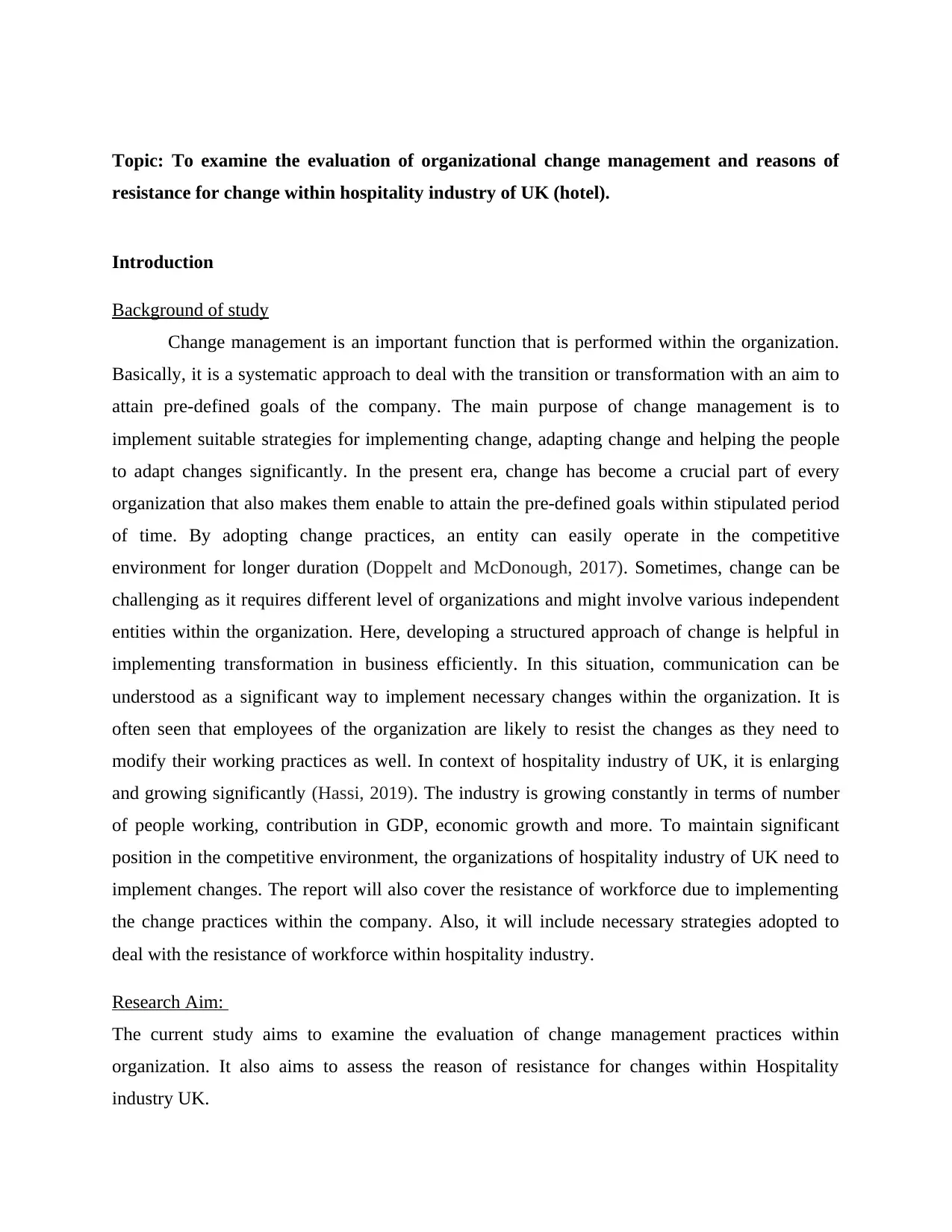
Topic: To examine the evaluation of organizational change management and reasons of
resistance for change within hospitality industry of UK (hotel).
Introduction
Background of study
Change management is an important function that is performed within the organization.
Basically, it is a systematic approach to deal with the transition or transformation with an aim to
attain pre-defined goals of the company. The main purpose of change management is to
implement suitable strategies for implementing change, adapting change and helping the people
to adapt changes significantly. In the present era, change has become a crucial part of every
organization that also makes them enable to attain the pre-defined goals within stipulated period
of time. By adopting change practices, an entity can easily operate in the competitive
environment for longer duration (Doppelt and McDonough, 2017). Sometimes, change can be
challenging as it requires different level of organizations and might involve various independent
entities within the organization. Here, developing a structured approach of change is helpful in
implementing transformation in business efficiently. In this situation, communication can be
understood as a significant way to implement necessary changes within the organization. It is
often seen that employees of the organization are likely to resist the changes as they need to
modify their working practices as well. In context of hospitality industry of UK, it is enlarging
and growing significantly (Hassi, 2019). The industry is growing constantly in terms of number
of people working, contribution in GDP, economic growth and more. To maintain significant
position in the competitive environment, the organizations of hospitality industry of UK need to
implement changes. The report will also cover the resistance of workforce due to implementing
the change practices within the company. Also, it will include necessary strategies adopted to
deal with the resistance of workforce within hospitality industry.
Research Aim:
The current study aims to examine the evaluation of change management practices within
organization. It also aims to assess the reason of resistance for changes within Hospitality
industry UK.
resistance for change within hospitality industry of UK (hotel).
Introduction
Background of study
Change management is an important function that is performed within the organization.
Basically, it is a systematic approach to deal with the transition or transformation with an aim to
attain pre-defined goals of the company. The main purpose of change management is to
implement suitable strategies for implementing change, adapting change and helping the people
to adapt changes significantly. In the present era, change has become a crucial part of every
organization that also makes them enable to attain the pre-defined goals within stipulated period
of time. By adopting change practices, an entity can easily operate in the competitive
environment for longer duration (Doppelt and McDonough, 2017). Sometimes, change can be
challenging as it requires different level of organizations and might involve various independent
entities within the organization. Here, developing a structured approach of change is helpful in
implementing transformation in business efficiently. In this situation, communication can be
understood as a significant way to implement necessary changes within the organization. It is
often seen that employees of the organization are likely to resist the changes as they need to
modify their working practices as well. In context of hospitality industry of UK, it is enlarging
and growing significantly (Hassi, 2019). The industry is growing constantly in terms of number
of people working, contribution in GDP, economic growth and more. To maintain significant
position in the competitive environment, the organizations of hospitality industry of UK need to
implement changes. The report will also cover the resistance of workforce due to implementing
the change practices within the company. Also, it will include necessary strategies adopted to
deal with the resistance of workforce within hospitality industry.
Research Aim:
The current study aims to examine the evaluation of change management practices within
organization. It also aims to assess the reason of resistance for changes within Hospitality
industry UK.
Paraphrase This Document
Need a fresh take? Get an instant paraphrase of this document with our AI Paraphraser
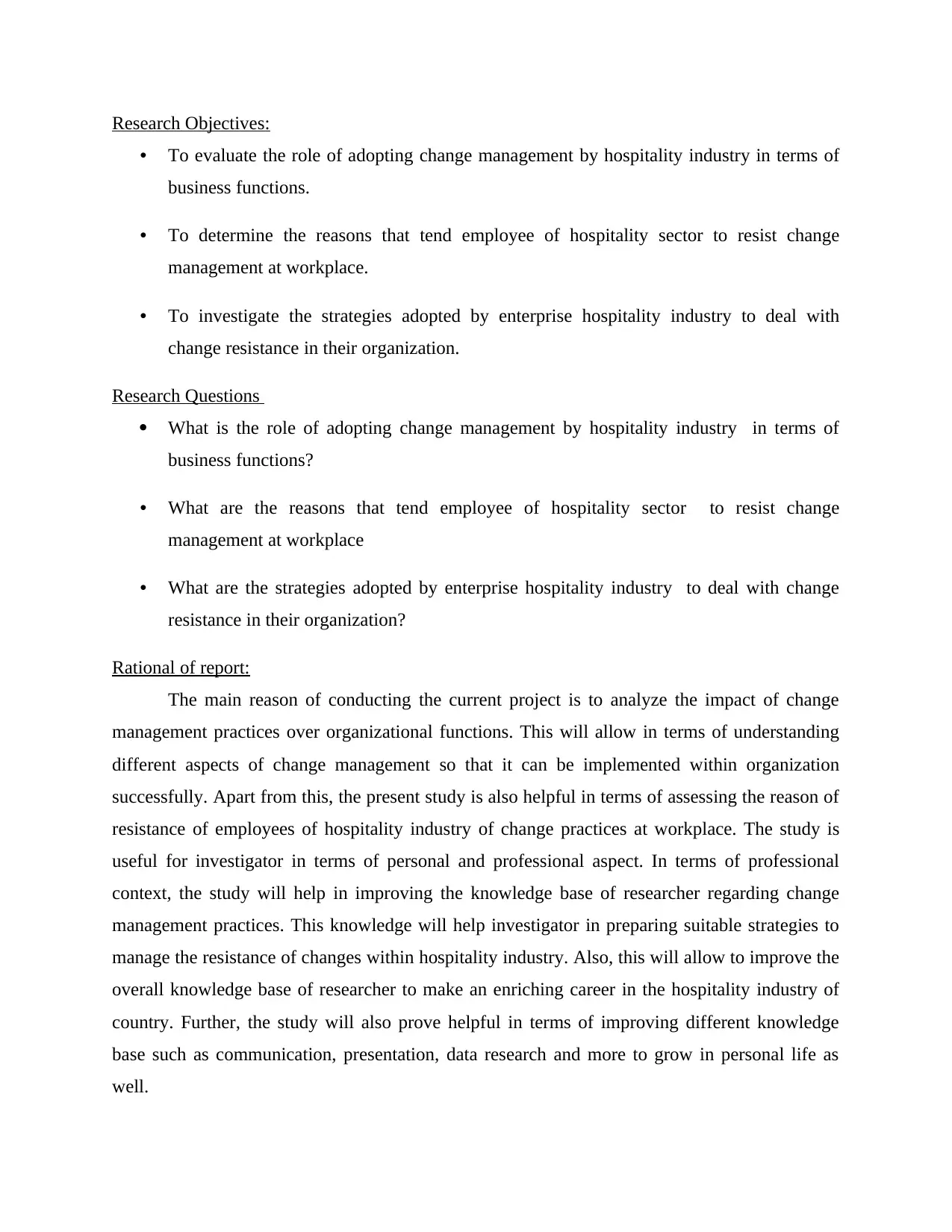
Research Objectives:
• To evaluate the role of adopting change management by hospitality industry in terms of
business functions.
• To determine the reasons that tend employee of hospitality sector to resist change
management at workplace.
• To investigate the strategies adopted by enterprise hospitality industry to deal with
change resistance in their organization.
Research Questions
What is the role of adopting change management by hospitality industry in terms of
business functions?
• What are the reasons that tend employee of hospitality sector to resist change
management at workplace
• What are the strategies adopted by enterprise hospitality industry to deal with change
resistance in their organization?
Rational of report:
The main reason of conducting the current project is to analyze the impact of change
management practices over organizational functions. This will allow in terms of understanding
different aspects of change management so that it can be implemented within organization
successfully. Apart from this, the present study is also helpful in terms of assessing the reason of
resistance of employees of hospitality industry of change practices at workplace. The study is
useful for investigator in terms of personal and professional aspect. In terms of professional
context, the study will help in improving the knowledge base of researcher regarding change
management practices. This knowledge will help investigator in preparing suitable strategies to
manage the resistance of changes within hospitality industry. Also, this will allow to improve the
overall knowledge base of researcher to make an enriching career in the hospitality industry of
country. Further, the study will also prove helpful in terms of improving different knowledge
base such as communication, presentation, data research and more to grow in personal life as
well.
• To evaluate the role of adopting change management by hospitality industry in terms of
business functions.
• To determine the reasons that tend employee of hospitality sector to resist change
management at workplace.
• To investigate the strategies adopted by enterprise hospitality industry to deal with
change resistance in their organization.
Research Questions
What is the role of adopting change management by hospitality industry in terms of
business functions?
• What are the reasons that tend employee of hospitality sector to resist change
management at workplace
• What are the strategies adopted by enterprise hospitality industry to deal with change
resistance in their organization?
Rational of report:
The main reason of conducting the current project is to analyze the impact of change
management practices over organizational functions. This will allow in terms of understanding
different aspects of change management so that it can be implemented within organization
successfully. Apart from this, the present study is also helpful in terms of assessing the reason of
resistance of employees of hospitality industry of change practices at workplace. The study is
useful for investigator in terms of personal and professional aspect. In terms of professional
context, the study will help in improving the knowledge base of researcher regarding change
management practices. This knowledge will help investigator in preparing suitable strategies to
manage the resistance of changes within hospitality industry. Also, this will allow to improve the
overall knowledge base of researcher to make an enriching career in the hospitality industry of
country. Further, the study will also prove helpful in terms of improving different knowledge
base such as communication, presentation, data research and more to grow in personal life as
well.
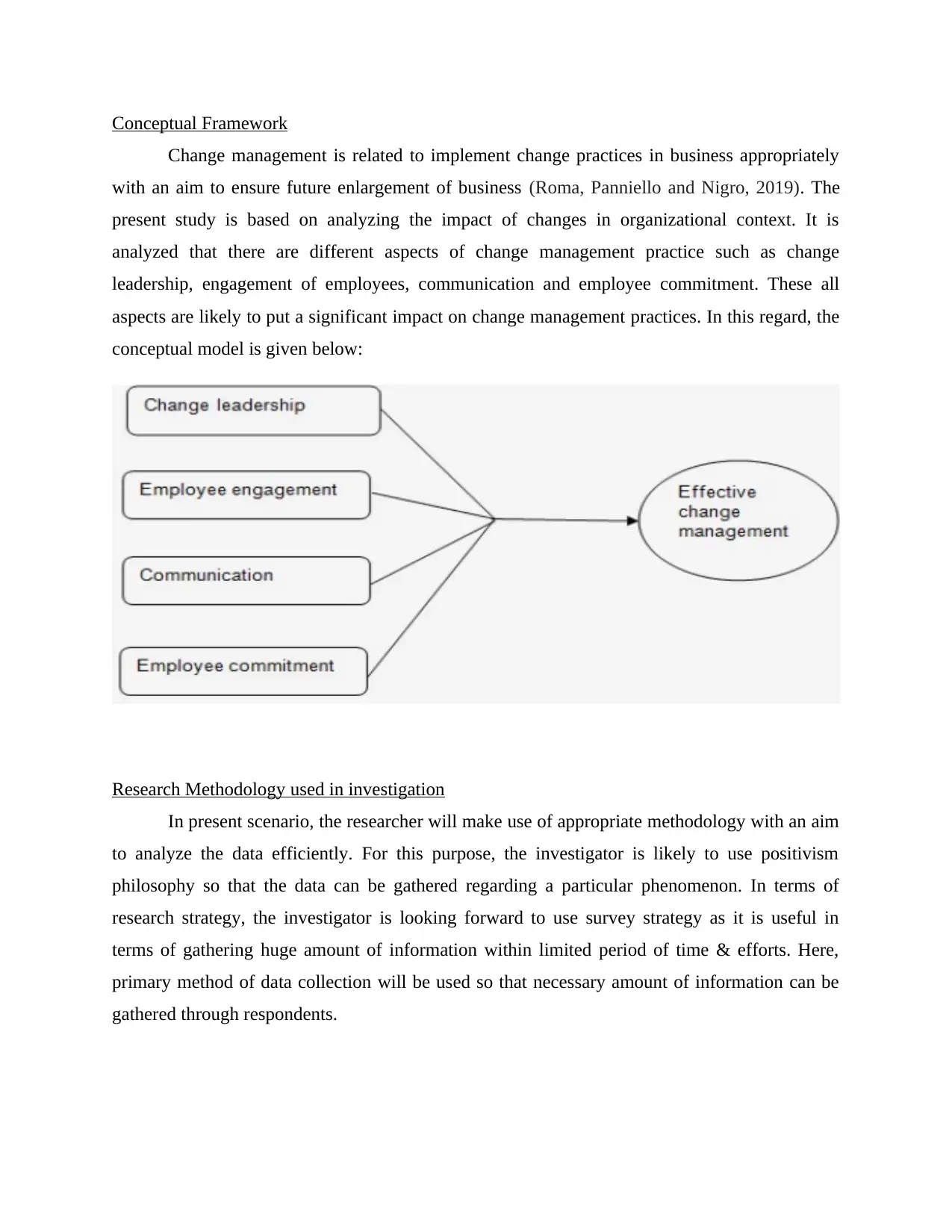
Conceptual Framework
Change management is related to implement change practices in business appropriately
with an aim to ensure future enlargement of business (Roma, Panniello and Nigro, 2019). The
present study is based on analyzing the impact of changes in organizational context. It is
analyzed that there are different aspects of change management practice such as change
leadership, engagement of employees, communication and employee commitment. These all
aspects are likely to put a significant impact on change management practices. In this regard, the
conceptual model is given below:
Research Methodology used in investigation
In present scenario, the researcher will make use of appropriate methodology with an aim
to analyze the data efficiently. For this purpose, the investigator is likely to use positivism
philosophy so that the data can be gathered regarding a particular phenomenon. In terms of
research strategy, the investigator is looking forward to use survey strategy as it is useful in
terms of gathering huge amount of information within limited period of time & efforts. Here,
primary method of data collection will be used so that necessary amount of information can be
gathered through respondents.
Change management is related to implement change practices in business appropriately
with an aim to ensure future enlargement of business (Roma, Panniello and Nigro, 2019). The
present study is based on analyzing the impact of changes in organizational context. It is
analyzed that there are different aspects of change management practice such as change
leadership, engagement of employees, communication and employee commitment. These all
aspects are likely to put a significant impact on change management practices. In this regard, the
conceptual model is given below:
Research Methodology used in investigation
In present scenario, the researcher will make use of appropriate methodology with an aim
to analyze the data efficiently. For this purpose, the investigator is likely to use positivism
philosophy so that the data can be gathered regarding a particular phenomenon. In terms of
research strategy, the investigator is looking forward to use survey strategy as it is useful in
terms of gathering huge amount of information within limited period of time & efforts. Here,
primary method of data collection will be used so that necessary amount of information can be
gathered through respondents.
⊘ This is a preview!⊘
Do you want full access?
Subscribe today to unlock all pages.

Trusted by 1+ million students worldwide
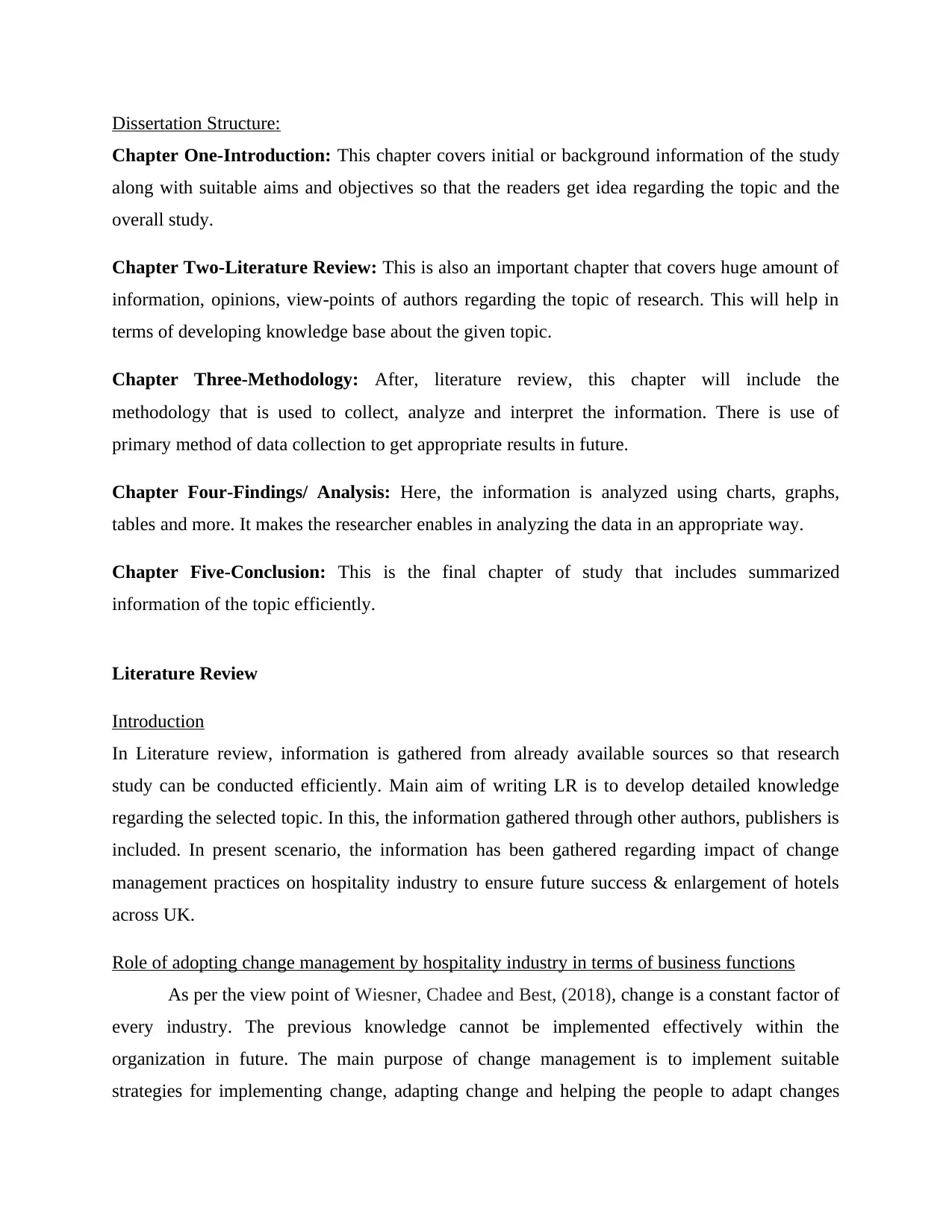
Dissertation Structure:
Chapter One-Introduction: This chapter covers initial or background information of the study
along with suitable aims and objectives so that the readers get idea regarding the topic and the
overall study.
Chapter Two-Literature Review: This is also an important chapter that covers huge amount of
information, opinions, view-points of authors regarding the topic of research. This will help in
terms of developing knowledge base about the given topic.
Chapter Three-Methodology: After, literature review, this chapter will include the
methodology that is used to collect, analyze and interpret the information. There is use of
primary method of data collection to get appropriate results in future.
Chapter Four-Findings/ Analysis: Here, the information is analyzed using charts, graphs,
tables and more. It makes the researcher enables in analyzing the data in an appropriate way.
Chapter Five-Conclusion: This is the final chapter of study that includes summarized
information of the topic efficiently.
Literature Review
Introduction
In Literature review, information is gathered from already available sources so that research
study can be conducted efficiently. Main aim of writing LR is to develop detailed knowledge
regarding the selected topic. In this, the information gathered through other authors, publishers is
included. In present scenario, the information has been gathered regarding impact of change
management practices on hospitality industry to ensure future success & enlargement of hotels
across UK.
Role of adopting change management by hospitality industry in terms of business functions
As per the view point of Wiesner, Chadee and Best, (2018), change is a constant factor of
every industry. The previous knowledge cannot be implemented effectively within the
organization in future. The main purpose of change management is to implement suitable
strategies for implementing change, adapting change and helping the people to adapt changes
Chapter One-Introduction: This chapter covers initial or background information of the study
along with suitable aims and objectives so that the readers get idea regarding the topic and the
overall study.
Chapter Two-Literature Review: This is also an important chapter that covers huge amount of
information, opinions, view-points of authors regarding the topic of research. This will help in
terms of developing knowledge base about the given topic.
Chapter Three-Methodology: After, literature review, this chapter will include the
methodology that is used to collect, analyze and interpret the information. There is use of
primary method of data collection to get appropriate results in future.
Chapter Four-Findings/ Analysis: Here, the information is analyzed using charts, graphs,
tables and more. It makes the researcher enables in analyzing the data in an appropriate way.
Chapter Five-Conclusion: This is the final chapter of study that includes summarized
information of the topic efficiently.
Literature Review
Introduction
In Literature review, information is gathered from already available sources so that research
study can be conducted efficiently. Main aim of writing LR is to develop detailed knowledge
regarding the selected topic. In this, the information gathered through other authors, publishers is
included. In present scenario, the information has been gathered regarding impact of change
management practices on hospitality industry to ensure future success & enlargement of hotels
across UK.
Role of adopting change management by hospitality industry in terms of business functions
As per the view point of Wiesner, Chadee and Best, (2018), change is a constant factor of
every industry. The previous knowledge cannot be implemented effectively within the
organization in future. The main purpose of change management is to implement suitable
strategies for implementing change, adapting change and helping the people to adapt changes
Paraphrase This Document
Need a fresh take? Get an instant paraphrase of this document with our AI Paraphraser
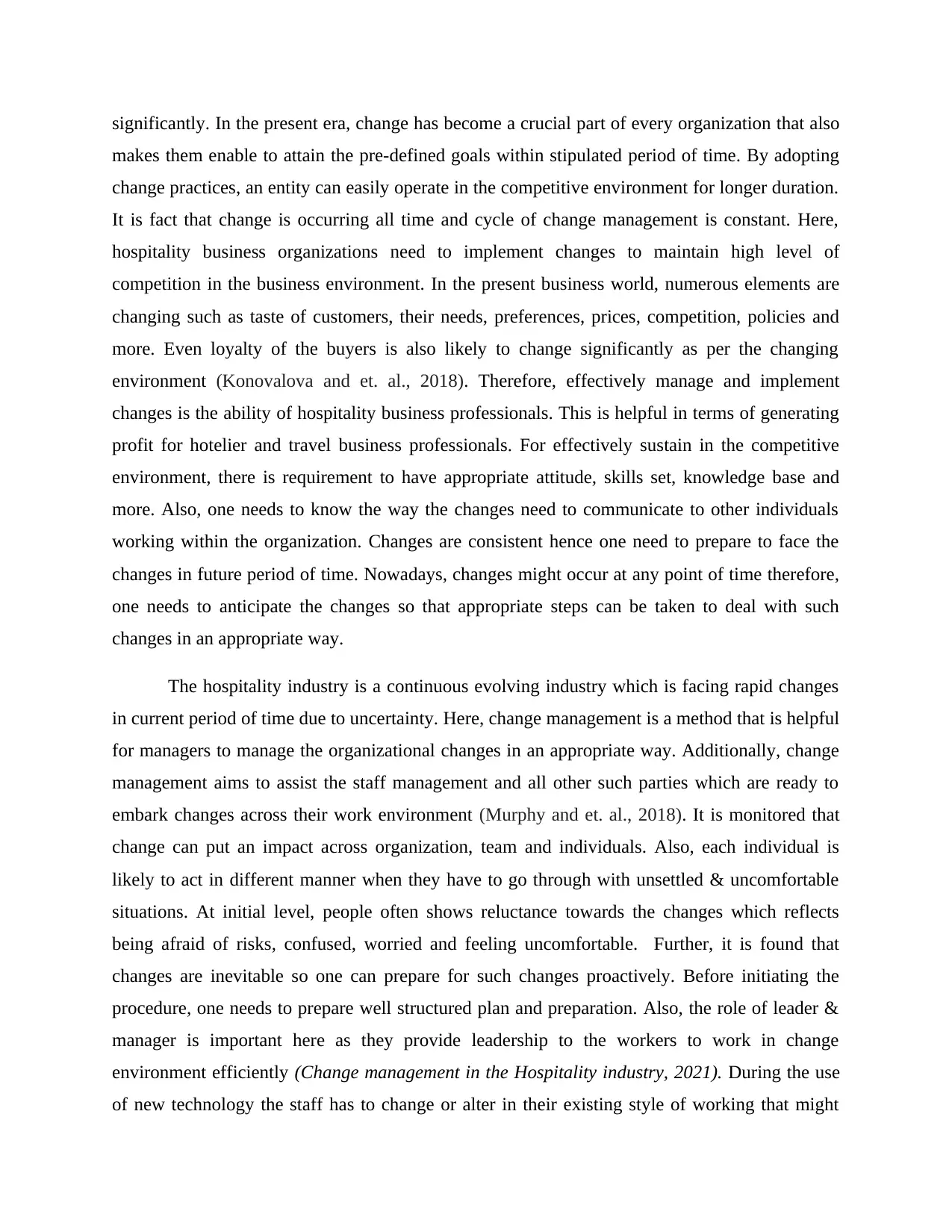
significantly. In the present era, change has become a crucial part of every organization that also
makes them enable to attain the pre-defined goals within stipulated period of time. By adopting
change practices, an entity can easily operate in the competitive environment for longer duration.
It is fact that change is occurring all time and cycle of change management is constant. Here,
hospitality business organizations need to implement changes to maintain high level of
competition in the business environment. In the present business world, numerous elements are
changing such as taste of customers, their needs, preferences, prices, competition, policies and
more. Even loyalty of the buyers is also likely to change significantly as per the changing
environment (Konovalova and et. al., 2018). Therefore, effectively manage and implement
changes is the ability of hospitality business professionals. This is helpful in terms of generating
profit for hotelier and travel business professionals. For effectively sustain in the competitive
environment, there is requirement to have appropriate attitude, skills set, knowledge base and
more. Also, one needs to know the way the changes need to communicate to other individuals
working within the organization. Changes are consistent hence one need to prepare to face the
changes in future period of time. Nowadays, changes might occur at any point of time therefore,
one needs to anticipate the changes so that appropriate steps can be taken to deal with such
changes in an appropriate way.
The hospitality industry is a continuous evolving industry which is facing rapid changes
in current period of time due to uncertainty. Here, change management is a method that is helpful
for managers to manage the organizational changes in an appropriate way. Additionally, change
management aims to assist the staff management and all other such parties which are ready to
embark changes across their work environment (Murphy and et. al., 2018). It is monitored that
change can put an impact across organization, team and individuals. Also, each individual is
likely to act in different manner when they have to go through with unsettled & uncomfortable
situations. At initial level, people often shows reluctance towards the changes which reflects
being afraid of risks, confused, worried and feeling uncomfortable. Further, it is found that
changes are inevitable so one can prepare for such changes proactively. Before initiating the
procedure, one needs to prepare well structured plan and preparation. Also, the role of leader &
manager is important here as they provide leadership to the workers to work in change
environment efficiently (Change management in the Hospitality industry, 2021). During the use
of new technology the staff has to change or alter in their existing style of working that might
makes them enable to attain the pre-defined goals within stipulated period of time. By adopting
change practices, an entity can easily operate in the competitive environment for longer duration.
It is fact that change is occurring all time and cycle of change management is constant. Here,
hospitality business organizations need to implement changes to maintain high level of
competition in the business environment. In the present business world, numerous elements are
changing such as taste of customers, their needs, preferences, prices, competition, policies and
more. Even loyalty of the buyers is also likely to change significantly as per the changing
environment (Konovalova and et. al., 2018). Therefore, effectively manage and implement
changes is the ability of hospitality business professionals. This is helpful in terms of generating
profit for hotelier and travel business professionals. For effectively sustain in the competitive
environment, there is requirement to have appropriate attitude, skills set, knowledge base and
more. Also, one needs to know the way the changes need to communicate to other individuals
working within the organization. Changes are consistent hence one need to prepare to face the
changes in future period of time. Nowadays, changes might occur at any point of time therefore,
one needs to anticipate the changes so that appropriate steps can be taken to deal with such
changes in an appropriate way.
The hospitality industry is a continuous evolving industry which is facing rapid changes
in current period of time due to uncertainty. Here, change management is a method that is helpful
for managers to manage the organizational changes in an appropriate way. Additionally, change
management aims to assist the staff management and all other such parties which are ready to
embark changes across their work environment (Murphy and et. al., 2018). It is monitored that
change can put an impact across organization, team and individuals. Also, each individual is
likely to act in different manner when they have to go through with unsettled & uncomfortable
situations. At initial level, people often shows reluctance towards the changes which reflects
being afraid of risks, confused, worried and feeling uncomfortable. Further, it is found that
changes are inevitable so one can prepare for such changes proactively. Before initiating the
procedure, one needs to prepare well structured plan and preparation. Also, the role of leader &
manager is important here as they provide leadership to the workers to work in change
environment efficiently (Change management in the Hospitality industry, 2021). During the use
of new technology the staff has to change or alter in their existing style of working that might
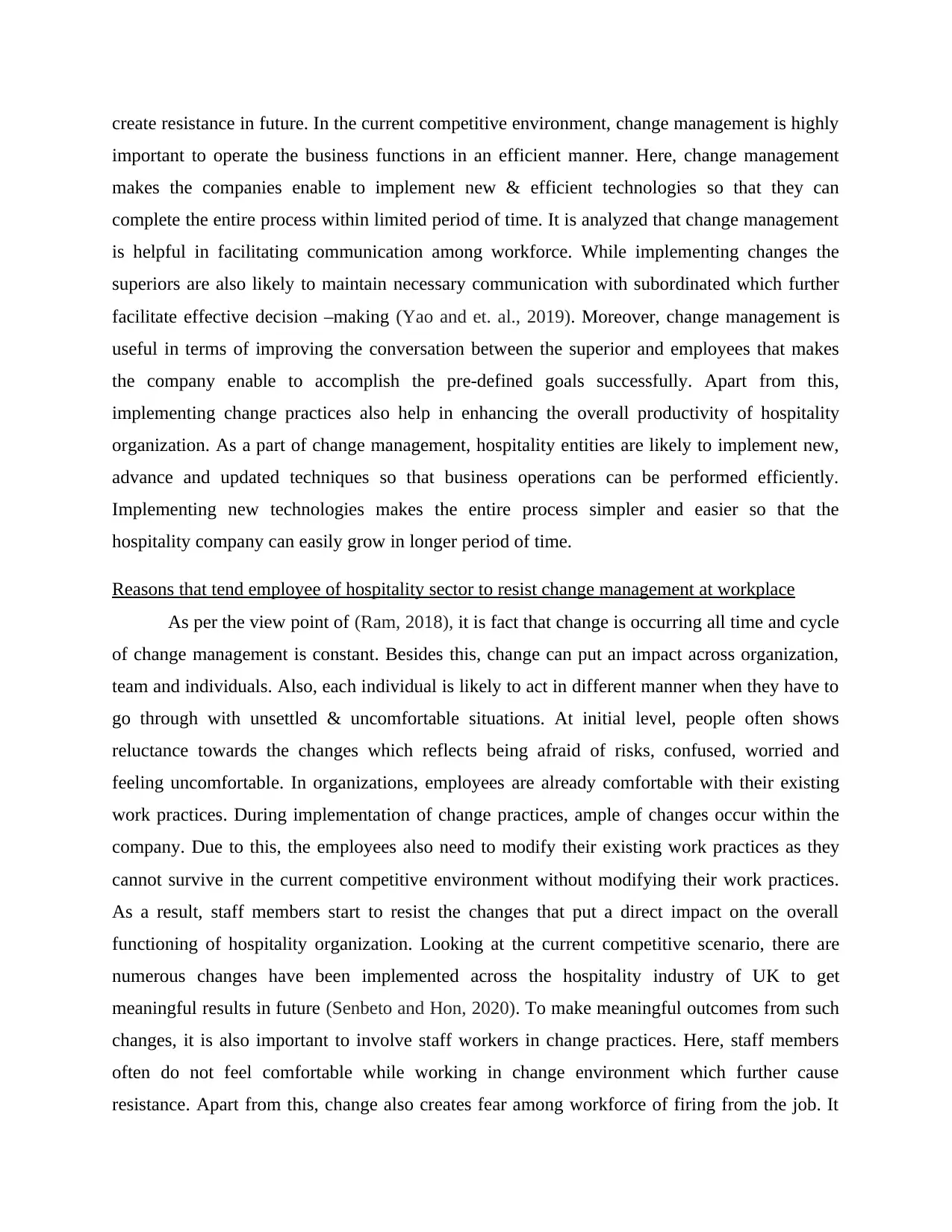
create resistance in future. In the current competitive environment, change management is highly
important to operate the business functions in an efficient manner. Here, change management
makes the companies enable to implement new & efficient technologies so that they can
complete the entire process within limited period of time. It is analyzed that change management
is helpful in facilitating communication among workforce. While implementing changes the
superiors are also likely to maintain necessary communication with subordinated which further
facilitate effective decision –making (Yao and et. al., 2019). Moreover, change management is
useful in terms of improving the conversation between the superior and employees that makes
the company enable to accomplish the pre-defined goals successfully. Apart from this,
implementing change practices also help in enhancing the overall productivity of hospitality
organization. As a part of change management, hospitality entities are likely to implement new,
advance and updated techniques so that business operations can be performed efficiently.
Implementing new technologies makes the entire process simpler and easier so that the
hospitality company can easily grow in longer period of time.
Reasons that tend employee of hospitality sector to resist change management at workplace
As per the view point of (Ram, 2018), it is fact that change is occurring all time and cycle
of change management is constant. Besides this, change can put an impact across organization,
team and individuals. Also, each individual is likely to act in different manner when they have to
go through with unsettled & uncomfortable situations. At initial level, people often shows
reluctance towards the changes which reflects being afraid of risks, confused, worried and
feeling uncomfortable. In organizations, employees are already comfortable with their existing
work practices. During implementation of change practices, ample of changes occur within the
company. Due to this, the employees also need to modify their existing work practices as they
cannot survive in the current competitive environment without modifying their work practices.
As a result, staff members start to resist the changes that put a direct impact on the overall
functioning of hospitality organization. Looking at the current competitive scenario, there are
numerous changes have been implemented across the hospitality industry of UK to get
meaningful results in future (Senbeto and Hon, 2020). To make meaningful outcomes from such
changes, it is also important to involve staff workers in change practices. Here, staff members
often do not feel comfortable while working in change environment which further cause
resistance. Apart from this, change also creates fear among workforce of firing from the job. It
important to operate the business functions in an efficient manner. Here, change management
makes the companies enable to implement new & efficient technologies so that they can
complete the entire process within limited period of time. It is analyzed that change management
is helpful in facilitating communication among workforce. While implementing changes the
superiors are also likely to maintain necessary communication with subordinated which further
facilitate effective decision –making (Yao and et. al., 2019). Moreover, change management is
useful in terms of improving the conversation between the superior and employees that makes
the company enable to accomplish the pre-defined goals successfully. Apart from this,
implementing change practices also help in enhancing the overall productivity of hospitality
organization. As a part of change management, hospitality entities are likely to implement new,
advance and updated techniques so that business operations can be performed efficiently.
Implementing new technologies makes the entire process simpler and easier so that the
hospitality company can easily grow in longer period of time.
Reasons that tend employee of hospitality sector to resist change management at workplace
As per the view point of (Ram, 2018), it is fact that change is occurring all time and cycle
of change management is constant. Besides this, change can put an impact across organization,
team and individuals. Also, each individual is likely to act in different manner when they have to
go through with unsettled & uncomfortable situations. At initial level, people often shows
reluctance towards the changes which reflects being afraid of risks, confused, worried and
feeling uncomfortable. In organizations, employees are already comfortable with their existing
work practices. During implementation of change practices, ample of changes occur within the
company. Due to this, the employees also need to modify their existing work practices as they
cannot survive in the current competitive environment without modifying their work practices.
As a result, staff members start to resist the changes that put a direct impact on the overall
functioning of hospitality organization. Looking at the current competitive scenario, there are
numerous changes have been implemented across the hospitality industry of UK to get
meaningful results in future (Senbeto and Hon, 2020). To make meaningful outcomes from such
changes, it is also important to involve staff workers in change practices. Here, staff members
often do not feel comfortable while working in change environment which further cause
resistance. Apart from this, change also creates fear among workforce of firing from the job. It
⊘ This is a preview!⊘
Do you want full access?
Subscribe today to unlock all pages.

Trusted by 1+ million students worldwide
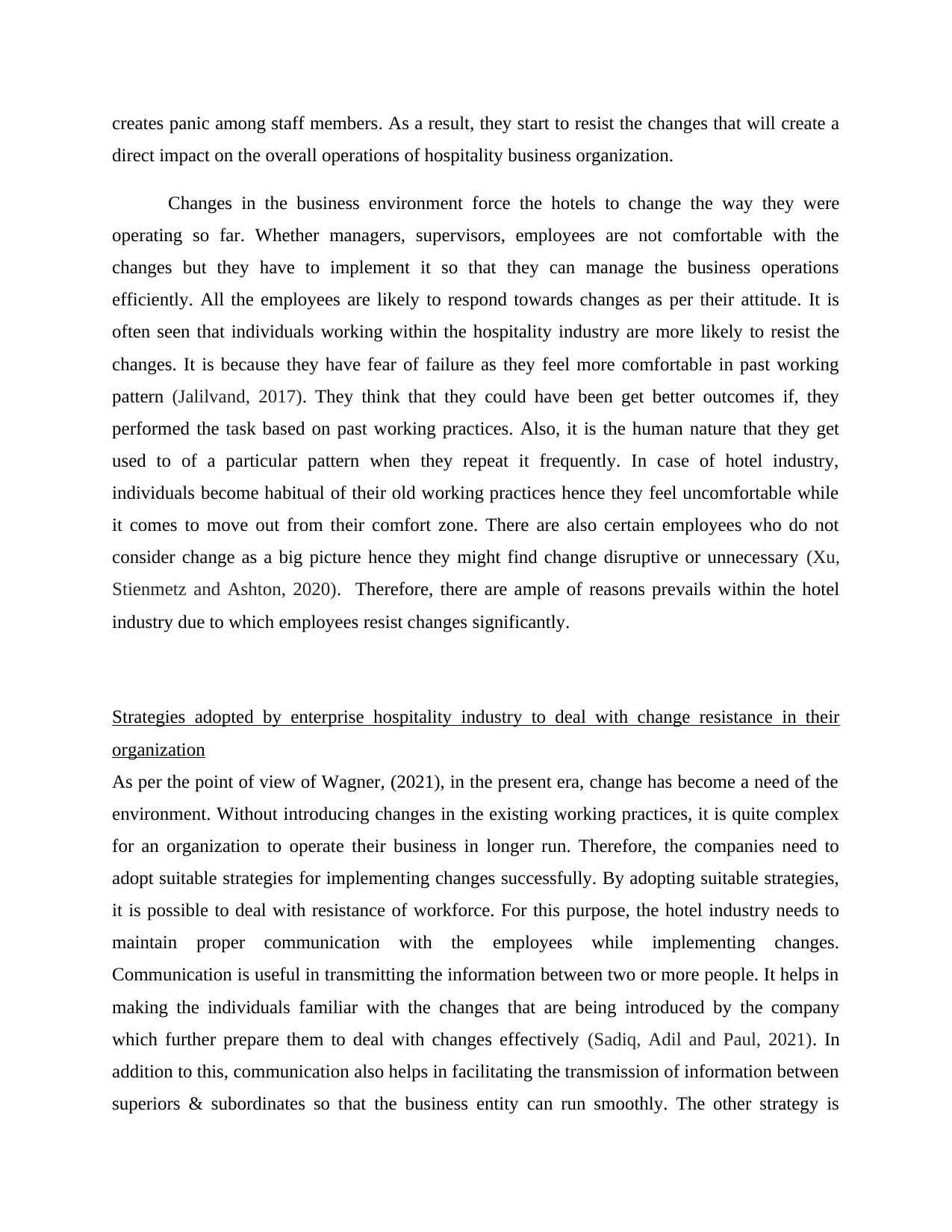
creates panic among staff members. As a result, they start to resist the changes that will create a
direct impact on the overall operations of hospitality business organization.
Changes in the business environment force the hotels to change the way they were
operating so far. Whether managers, supervisors, employees are not comfortable with the
changes but they have to implement it so that they can manage the business operations
efficiently. All the employees are likely to respond towards changes as per their attitude. It is
often seen that individuals working within the hospitality industry are more likely to resist the
changes. It is because they have fear of failure as they feel more comfortable in past working
pattern (Jalilvand, 2017). They think that they could have been get better outcomes if, they
performed the task based on past working practices. Also, it is the human nature that they get
used to of a particular pattern when they repeat it frequently. In case of hotel industry,
individuals become habitual of their old working practices hence they feel uncomfortable while
it comes to move out from their comfort zone. There are also certain employees who do not
consider change as a big picture hence they might find change disruptive or unnecessary (Xu,
Stienmetz and Ashton, 2020). Therefore, there are ample of reasons prevails within the hotel
industry due to which employees resist changes significantly.
Strategies adopted by enterprise hospitality industry to deal with change resistance in their
organization
As per the point of view of Wagner, (2021), in the present era, change has become a need of the
environment. Without introducing changes in the existing working practices, it is quite complex
for an organization to operate their business in longer run. Therefore, the companies need to
adopt suitable strategies for implementing changes successfully. By adopting suitable strategies,
it is possible to deal with resistance of workforce. For this purpose, the hotel industry needs to
maintain proper communication with the employees while implementing changes.
Communication is useful in transmitting the information between two or more people. It helps in
making the individuals familiar with the changes that are being introduced by the company
which further prepare them to deal with changes effectively (Sadiq, Adil and Paul, 2021). In
addition to this, communication also helps in facilitating the transmission of information between
superiors & subordinates so that the business entity can run smoothly. The other strategy is
direct impact on the overall operations of hospitality business organization.
Changes in the business environment force the hotels to change the way they were
operating so far. Whether managers, supervisors, employees are not comfortable with the
changes but they have to implement it so that they can manage the business operations
efficiently. All the employees are likely to respond towards changes as per their attitude. It is
often seen that individuals working within the hospitality industry are more likely to resist the
changes. It is because they have fear of failure as they feel more comfortable in past working
pattern (Jalilvand, 2017). They think that they could have been get better outcomes if, they
performed the task based on past working practices. Also, it is the human nature that they get
used to of a particular pattern when they repeat it frequently. In case of hotel industry,
individuals become habitual of their old working practices hence they feel uncomfortable while
it comes to move out from their comfort zone. There are also certain employees who do not
consider change as a big picture hence they might find change disruptive or unnecessary (Xu,
Stienmetz and Ashton, 2020). Therefore, there are ample of reasons prevails within the hotel
industry due to which employees resist changes significantly.
Strategies adopted by enterprise hospitality industry to deal with change resistance in their
organization
As per the point of view of Wagner, (2021), in the present era, change has become a need of the
environment. Without introducing changes in the existing working practices, it is quite complex
for an organization to operate their business in longer run. Therefore, the companies need to
adopt suitable strategies for implementing changes successfully. By adopting suitable strategies,
it is possible to deal with resistance of workforce. For this purpose, the hotel industry needs to
maintain proper communication with the employees while implementing changes.
Communication is useful in transmitting the information between two or more people. It helps in
making the individuals familiar with the changes that are being introduced by the company
which further prepare them to deal with changes effectively (Sadiq, Adil and Paul, 2021). In
addition to this, communication also helps in facilitating the transmission of information between
superiors & subordinates so that the business entity can run smoothly. The other strategy is
Paraphrase This Document
Need a fresh take? Get an instant paraphrase of this document with our AI Paraphraser
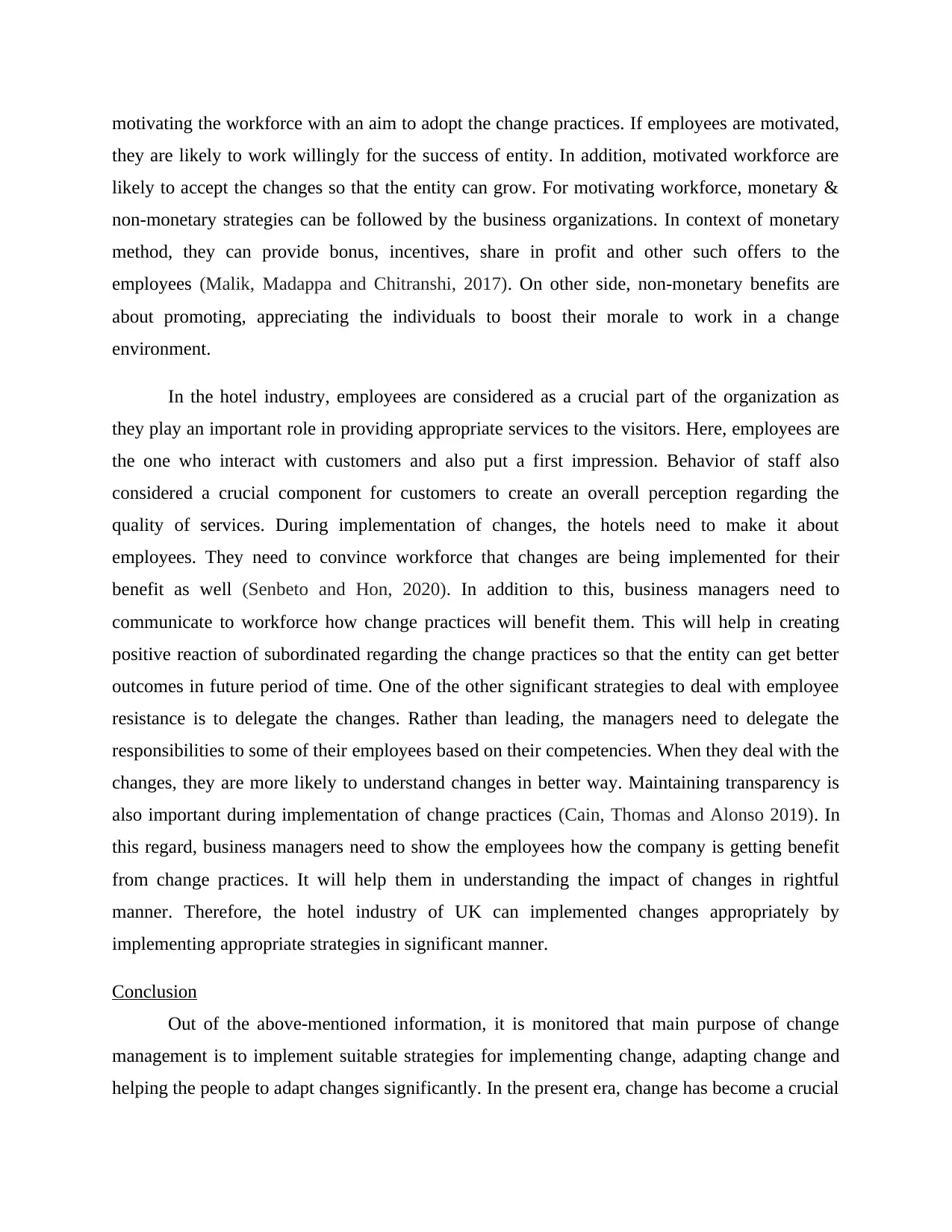
motivating the workforce with an aim to adopt the change practices. If employees are motivated,
they are likely to work willingly for the success of entity. In addition, motivated workforce are
likely to accept the changes so that the entity can grow. For motivating workforce, monetary &
non-monetary strategies can be followed by the business organizations. In context of monetary
method, they can provide bonus, incentives, share in profit and other such offers to the
employees (Malik, Madappa and Chitranshi, 2017). On other side, non-monetary benefits are
about promoting, appreciating the individuals to boost their morale to work in a change
environment.
In the hotel industry, employees are considered as a crucial part of the organization as
they play an important role in providing appropriate services to the visitors. Here, employees are
the one who interact with customers and also put a first impression. Behavior of staff also
considered a crucial component for customers to create an overall perception regarding the
quality of services. During implementation of changes, the hotels need to make it about
employees. They need to convince workforce that changes are being implemented for their
benefit as well (Senbeto and Hon, 2020). In addition to this, business managers need to
communicate to workforce how change practices will benefit them. This will help in creating
positive reaction of subordinated regarding the change practices so that the entity can get better
outcomes in future period of time. One of the other significant strategies to deal with employee
resistance is to delegate the changes. Rather than leading, the managers need to delegate the
responsibilities to some of their employees based on their competencies. When they deal with the
changes, they are more likely to understand changes in better way. Maintaining transparency is
also important during implementation of change practices (Cain, Thomas and Alonso 2019). In
this regard, business managers need to show the employees how the company is getting benefit
from change practices. It will help them in understanding the impact of changes in rightful
manner. Therefore, the hotel industry of UK can implemented changes appropriately by
implementing appropriate strategies in significant manner.
Conclusion
Out of the above-mentioned information, it is monitored that main purpose of change
management is to implement suitable strategies for implementing change, adapting change and
helping the people to adapt changes significantly. In the present era, change has become a crucial
they are likely to work willingly for the success of entity. In addition, motivated workforce are
likely to accept the changes so that the entity can grow. For motivating workforce, monetary &
non-monetary strategies can be followed by the business organizations. In context of monetary
method, they can provide bonus, incentives, share in profit and other such offers to the
employees (Malik, Madappa and Chitranshi, 2017). On other side, non-monetary benefits are
about promoting, appreciating the individuals to boost their morale to work in a change
environment.
In the hotel industry, employees are considered as a crucial part of the organization as
they play an important role in providing appropriate services to the visitors. Here, employees are
the one who interact with customers and also put a first impression. Behavior of staff also
considered a crucial component for customers to create an overall perception regarding the
quality of services. During implementation of changes, the hotels need to make it about
employees. They need to convince workforce that changes are being implemented for their
benefit as well (Senbeto and Hon, 2020). In addition to this, business managers need to
communicate to workforce how change practices will benefit them. This will help in creating
positive reaction of subordinated regarding the change practices so that the entity can get better
outcomes in future period of time. One of the other significant strategies to deal with employee
resistance is to delegate the changes. Rather than leading, the managers need to delegate the
responsibilities to some of their employees based on their competencies. When they deal with the
changes, they are more likely to understand changes in better way. Maintaining transparency is
also important during implementation of change practices (Cain, Thomas and Alonso 2019). In
this regard, business managers need to show the employees how the company is getting benefit
from change practices. It will help them in understanding the impact of changes in rightful
manner. Therefore, the hotel industry of UK can implemented changes appropriately by
implementing appropriate strategies in significant manner.
Conclusion
Out of the above-mentioned information, it is monitored that main purpose of change
management is to implement suitable strategies for implementing change, adapting change and
helping the people to adapt changes significantly. In the present era, change has become a crucial
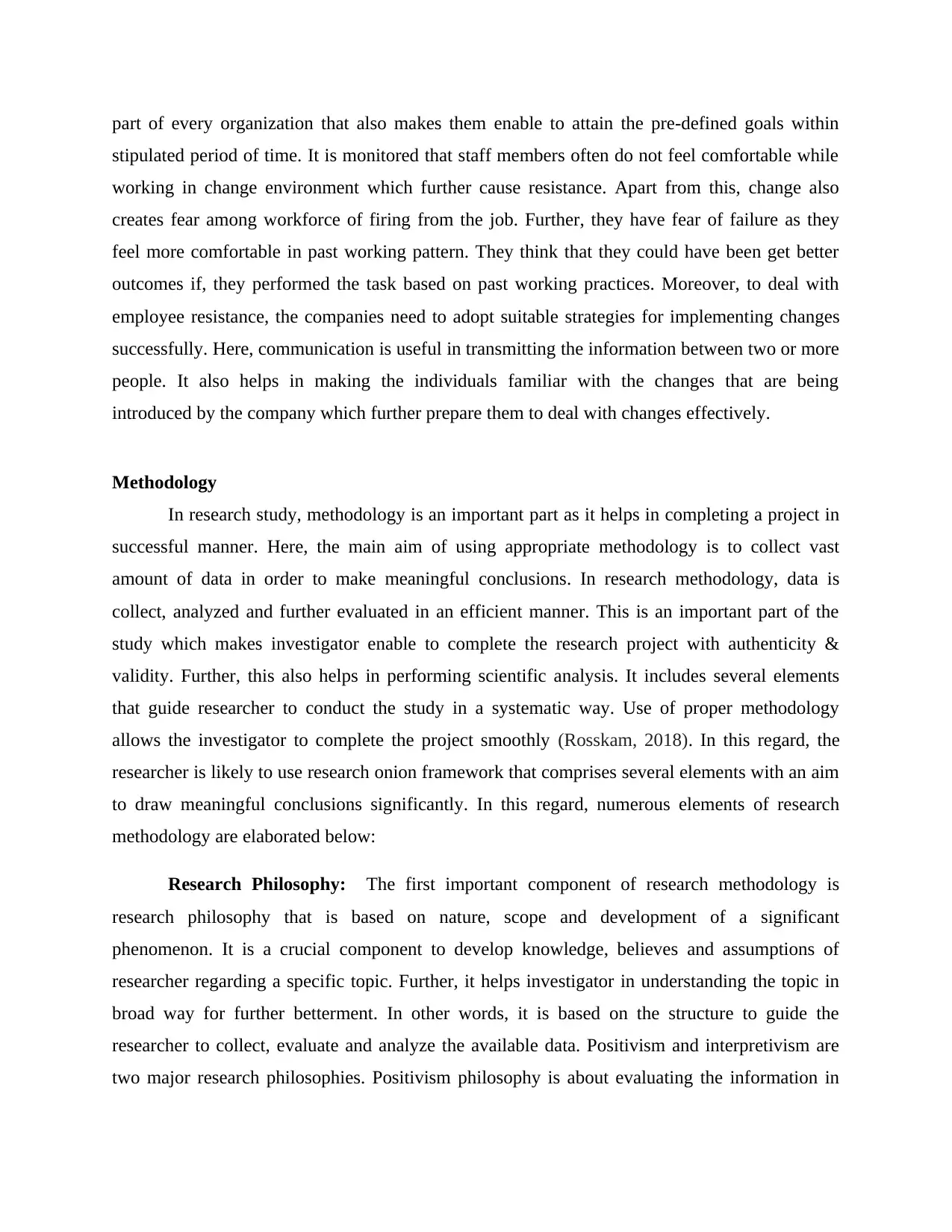
part of every organization that also makes them enable to attain the pre-defined goals within
stipulated period of time. It is monitored that staff members often do not feel comfortable while
working in change environment which further cause resistance. Apart from this, change also
creates fear among workforce of firing from the job. Further, they have fear of failure as they
feel more comfortable in past working pattern. They think that they could have been get better
outcomes if, they performed the task based on past working practices. Moreover, to deal with
employee resistance, the companies need to adopt suitable strategies for implementing changes
successfully. Here, communication is useful in transmitting the information between two or more
people. It also helps in making the individuals familiar with the changes that are being
introduced by the company which further prepare them to deal with changes effectively.
Methodology
In research study, methodology is an important part as it helps in completing a project in
successful manner. Here, the main aim of using appropriate methodology is to collect vast
amount of data in order to make meaningful conclusions. In research methodology, data is
collect, analyzed and further evaluated in an efficient manner. This is an important part of the
study which makes investigator enable to complete the research project with authenticity &
validity. Further, this also helps in performing scientific analysis. It includes several elements
that guide researcher to conduct the study in a systematic way. Use of proper methodology
allows the investigator to complete the project smoothly (Rosskam, 2018). In this regard, the
researcher is likely to use research onion framework that comprises several elements with an aim
to draw meaningful conclusions significantly. In this regard, numerous elements of research
methodology are elaborated below:
Research Philosophy: The first important component of research methodology is
research philosophy that is based on nature, scope and development of a significant
phenomenon. It is a crucial component to develop knowledge, believes and assumptions of
researcher regarding a specific topic. Further, it helps investigator in understanding the topic in
broad way for further betterment. In other words, it is based on the structure to guide the
researcher to collect, evaluate and analyze the available data. Positivism and interpretivism are
two major research philosophies. Positivism philosophy is about evaluating the information in
stipulated period of time. It is monitored that staff members often do not feel comfortable while
working in change environment which further cause resistance. Apart from this, change also
creates fear among workforce of firing from the job. Further, they have fear of failure as they
feel more comfortable in past working pattern. They think that they could have been get better
outcomes if, they performed the task based on past working practices. Moreover, to deal with
employee resistance, the companies need to adopt suitable strategies for implementing changes
successfully. Here, communication is useful in transmitting the information between two or more
people. It also helps in making the individuals familiar with the changes that are being
introduced by the company which further prepare them to deal with changes effectively.
Methodology
In research study, methodology is an important part as it helps in completing a project in
successful manner. Here, the main aim of using appropriate methodology is to collect vast
amount of data in order to make meaningful conclusions. In research methodology, data is
collect, analyzed and further evaluated in an efficient manner. This is an important part of the
study which makes investigator enable to complete the research project with authenticity &
validity. Further, this also helps in performing scientific analysis. It includes several elements
that guide researcher to conduct the study in a systematic way. Use of proper methodology
allows the investigator to complete the project smoothly (Rosskam, 2018). In this regard, the
researcher is likely to use research onion framework that comprises several elements with an aim
to draw meaningful conclusions significantly. In this regard, numerous elements of research
methodology are elaborated below:
Research Philosophy: The first important component of research methodology is
research philosophy that is based on nature, scope and development of a significant
phenomenon. It is a crucial component to develop knowledge, believes and assumptions of
researcher regarding a specific topic. Further, it helps investigator in understanding the topic in
broad way for further betterment. In other words, it is based on the structure to guide the
researcher to collect, evaluate and analyze the available data. Positivism and interpretivism are
two major research philosophies. Positivism philosophy is about evaluating the information in
⊘ This is a preview!⊘
Do you want full access?
Subscribe today to unlock all pages.

Trusted by 1+ million students worldwide
1 out of 34
Related Documents
Your All-in-One AI-Powered Toolkit for Academic Success.
+13062052269
info@desklib.com
Available 24*7 on WhatsApp / Email
![[object Object]](/_next/static/media/star-bottom.7253800d.svg)
Unlock your academic potential
Copyright © 2020–2025 A2Z Services. All Rights Reserved. Developed and managed by ZUCOL.





